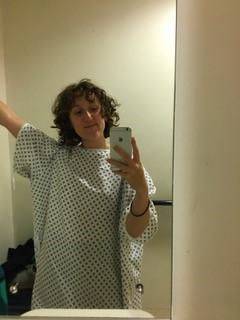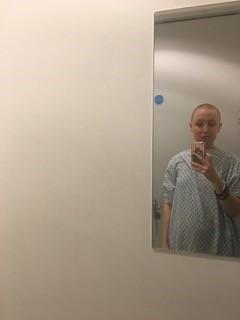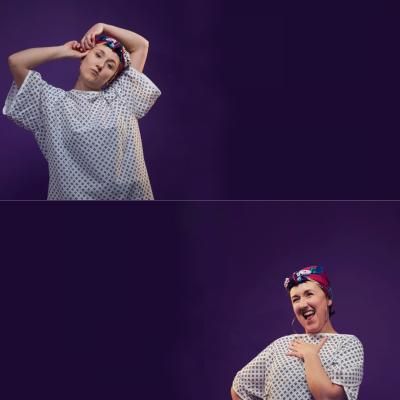I turned my cancer experience into a successful play
When Rosa was diagnosed with ovarian cancer, she had to put her acting career on hold. Here, she shares the story of how she reconnected with her creativity and took a play about her cancer experience to the Edinburgh Fringe Festival, making some special friendships along the way.
I’d just graduated from LAMDA drama school and completed my first professional acting job. I was excited about my acting career taking off and busy auditioning for more roles when I started to get severe bloating and pain in my stomach. I had back and rib pain too, and a numbness in my legs.
I put up with it for a month before going to a walk-in centre as I didn’t have a GP. They told me that I had trapped wind and a gluten intolerance. I went back to the walk-in centre a few times and followed their advice on how to alleviate the pain, but had to go to A&E when it got too much.
I had two ultrasounds, three CT scans, and an MRI before being diagnosed with ovarian cancer. I was in shock and thought I could continue working without telling my agent. I just assumed I could carry on as normal. I soon realised that wouldn’t be the case and my burgeoning career had to be put on hold. The cancer was so aggressive that I had to start the first lot of chemo almost immediately before they had even determined what type of ovarian cancer it was.
As ovarian cancer is more common in older women, I was in an adult ward surrounded by lots of people who were much older than me. Almost every day I heard someone being told that they were dying and would be moved to palliative care. There was lots of crying. It was terrifying to hear and very isolating. Luckily, people from the Teenage Cancer Trust came to see me and I had later cycles of chemo on their unit or the Teenage and Young Adult ward.
My Youth Support Coordinator at the time, Manju, was fantastic. From her first visit she made me feel welcome and like a friend. It’s an odd experience, but she made me feel at home in a hospital. She invited me to events on the wards, like pizza nights. I was reluctant to get involved at first, in fact my first words were: “F*** off, not a chance”. I thought that I wasn’t a normal person and that my life had been ruined by cancer. I was so stubborn and didn’t want life to change. The second time she invited me, I had come to accept that life had changed, I had no choice on that, but I did have a choice on how I responded.
I had come to accept that life had changed, I had no choice on that, but I did have a choice on how I responded.
I ended up meeting a lot of special people and I didn’t even know that it’s what I needed. I wasn’t alone anymore, and I had people my age to talk to. People who were further on in their treatment helped me, and I was able to help those just starting out. A lot of people don’t know how to act, but cancer friends take the piss and tell cancer jokes. We’d also talk about normal things like jobs, families and relationships.
Manju also told me about an opportunity to be a part of a workshop where I got to meet Tom Hingston, learn about graphic design and make a T-shirt. I love music and art, so I was really up for it. It was great that Manju considered people’s personalities and thought that I would benefit from the project because I’m creative. Cancer strips away so much of your personality and to have someone help build it up again like that is another level of care. There was only me and four other young people involved. The fact that it would be small and intimate also drew me in.
I went along to the first session and had such a good time. We didn’t talk about cancer to start with, just day to day things. But we felt so listened to and understood that we soon opened up and it was good to hear about the other people’s experiences. I haven’t done anything so much about cancer, but so not at the same time. It didn’t feel like a support group or a clinical thing; it was about art, creation and fun. I met people who I wouldn’t have met otherwise as they were from different areas and different walks of life.
Cancer strips away so much of your personality and to have someone help build it up again like that is another level of care.
During my treatment, I wrote poetry, a blog, and a one-women show called Madam Ovary which I performed at the Edinburgh Fringe Festival. I knew I had to write about my experience, and it was very cathartic. Taking the story of my cancer and turning it into a play has been incredible and sometimes I can’t believe I did it. The Edinburgh Fringe was an incredible place to take back control of the disease that took over my life, and having it picked up for a UK tour was beyond my wildest dreams. It feels so special to have made something I love from a traumatic experience.
The UK tour of Madame Ovary began in January 2020 and was everything I could have wished for; performing on some of my favourite stages in the country, telling a story that was mine, and that I was so proud of. However, the final three dates had to be cancelled, due to Covid. The pandemic was so tough. In all corners of my life, I could see how much it was affecting people: My friends from ‘theatre world’ were being told our industry wouldn’t survive, and my friends working in the NHS were stretched to their limits, and then some. My friends from ‘cancer world’ who had just completed treatment were suddenly told to put their lives back on hold. Or, most heartbreakingly, had their treatment put on hold or cancelled. I’ve felt heavy and unsurprising disappointment for so many years at our government’s response to the pandemic and the treatment of NHS staff, that wasn’t anything new and still continues now.
I am still writing and acting for a living, and am so grateful that writing Madame Ovary — and therefore my cancer experience itself — allowed me to start a professional career as a writer. I also feel grateful for the people I met through TCT - some of my close friends to this date. Cancer isn’t a part of my every day now. I’ll be five years clear in June 2023, and I think it’s good for my mental health to not have so much cancer in my every day life, so I’ve taken a step back from regularly attending events or writing/performing specifically about cancer. However, my gratitude for the charities and NHS workers who supported me and held me during that time will absolutely never diminish. They are a vital part of creating community within a diagnosis that is incredibly isolating and lonely, and I will never ever forget how much it helped me with my own.



